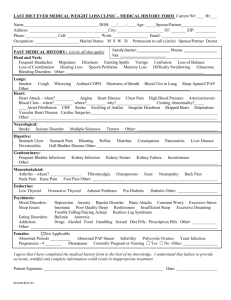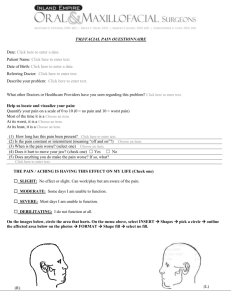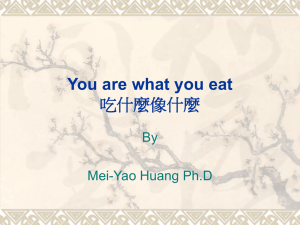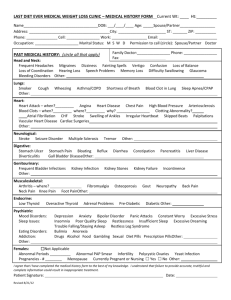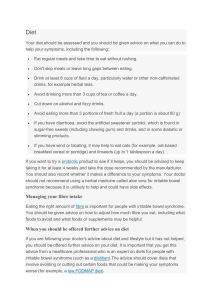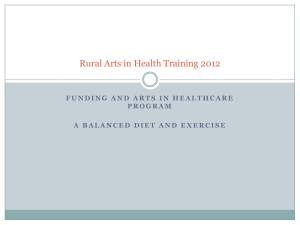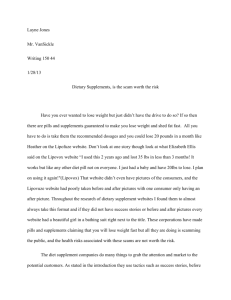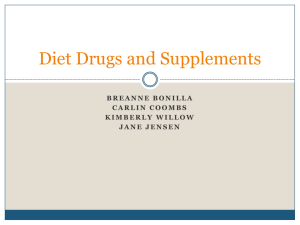RUNNERS VS
advertisement
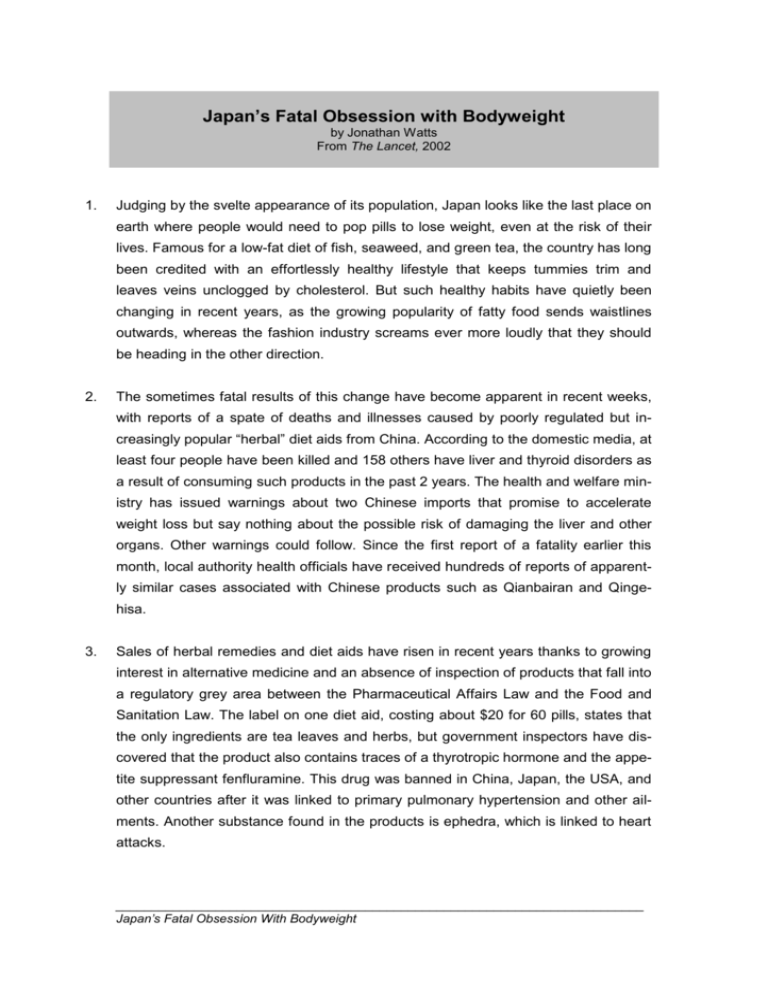
Japan’s Fatal Obsession with Bodyweight by Jonathan Watts From The Lancet, 2002 1. Judging by the svelte appearance of its population, Japan looks like the last place on earth where people would need to pop pills to lose weight, even at the risk of their lives. Famous for a low-fat diet of fish, seaweed, and green tea, the country has long been credited with an effortlessly healthy lifestyle that keeps tummies trim and leaves veins unclogged by cholesterol. But such healthy habits have quietly been changing in recent years, as the growing popularity of fatty food sends waistlines outwards, whereas the fashion industry screams ever more loudly that they should be heading in the other direction. 2. The sometimes fatal results of this change have become apparent in recent weeks, with reports of a spate of deaths and illnesses caused by poorly regulated but increasingly popular “herbal” diet aids from China. According to the domestic media, at least four people have been killed and 158 others have liver and thyroid disorders as a result of consuming such products in the past 2 years. The health and welfare ministry has issued warnings about two Chinese imports that promise to accelerate weight loss but say nothing about the possible risk of damaging the liver and other organs. Other warnings could follow. Since the first report of a fatality earlier this month, local authority health officials have received hundreds of reports of apparently similar cases associated with Chinese products such as Qianbairan and Qingehisa. 3. Sales of herbal remedies and diet aids have risen in recent years thanks to growing interest in alternative medicine and an absence of inspection of products that fall into a regulatory grey area between the Pharmaceutical Affairs Law and the Food and Sanitation Law. The label on one diet aid, costing about $20 for 60 pills, states that the only ingredients are tea leaves and herbs, but government inspectors have discovered that the product also contains traces of a thyrotropic hormone and the appetite suppressant fenfluramine. This drug was banned in China, Japan, the USA, and other countries after it was linked to primary pulmonary hypertension and other ailments. Another substance found in the products is ephedra, which is linked to heart attacks. __________________________________________________________________________ Japan’s Fatal Obsession With Bodyweight -2- 4. In response to public outcry about the fatalities, the Japanese health minister has launched an investigation into the incident and has called on China to improve its inspection and regulation system for the pharmaceutical and herbal-remedy industries. Such is the gravity of the incident that the Japanese foreign minister has also conveyed a similar message to Beijing. The health ministry is also reportedly planning to reform the Food and Sanitation Law so that “health products” deemed potentially harmful can be withdrawn even before consumers report side-effects. 5. Elsewhere in Asia, similar concerns are growing. Earlier this year, Singapore banned Yuzhitang’s “Slim 10” diet pills, which also contain fenfluramine, after they were blamed for the fatal liver-failure of one woman and threatened the life of a prominent TV personality in the country, Andrea De Cruz, whose life was saved by a liver transplant from her boyfriend. 6. Earlier this month, China also decided that enough was enough after the death of a woman in Guangdong province who had been taking Yuzhitang pills. It has banned the company from production of diet products. How effective such measures will prove remains to be seen. According to the Chinese media, the outlawed diet remedies can still be found on shops’ shelves. Newspapers have also reported Japaneselanguage websites that continue to offer the pills for sale. 7. Meanwhile, little is being done to change the diet and attitudes that prompted people to take the risky pills in the first place. Research by the Japanese health ministry suggests that the growth of the burger-and-fries business has increased obesity in men, whereas women, who are bombarded with advertisements extolling the desirability of thinness, weigh less than in the past. 8. The obsession with weight affects all ages - the first person who died after taking diet pills was a 60-year-old woman - and both sexes, but it is strongest among teenage girls. In May, a government-funded study found that 5% of children in Tokyo junior schools have anorexia nervosa, and reports of eating disorders have risen tenfold since 1980. The leader of the research team, Gen Komaki, of Japan’s National Institute of Mental Health, estimates that 47% of Japanese women are more than 10% under their ideal weight. 9. Similar trends are seen elsewhere in the region, as a combination of Asian affluence and Western influence take hold. A sign of the times is the counterreaction: the bud___________________________________________________________________________ Japan’s Fatal Obsession With Bodyweight -3- ding of a fat-is-fine movement. Hong Kong has recently seen the publication of a book called “Big Beautiful Woman”, which claims to be Asia’s first antislimming polemic. The Canadian-Chinese author, Patricia Wong, who has previously had anorexia, says the deaths due to diet pills show that the thinness craze in Asia is getting totally out of control. 10. Such views, however, are very much in the minority, especially among teenagers who have to fit into the tight jeans and pencil-thin skirts that are the latest fashion in Tokyo. The fact that some people are risking their lives for their weight suggests that it is not merely the regulatory system that needs reforming. With something clearly very wrong with social attitudes, the fashion industry might well consider tipping the perception scales in a new direction ___________________________________________________________________________ Japan’s Fatal Obsession With Bodyweight -4- ___________________________________________________________________________ Japan’s Fatal Obsession With Bodyweight

